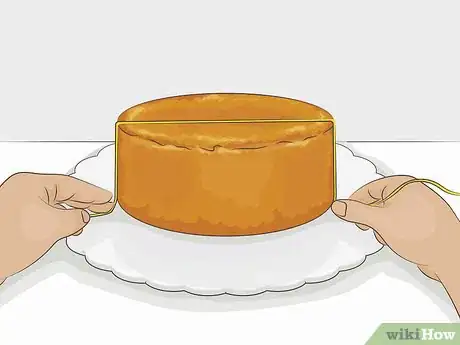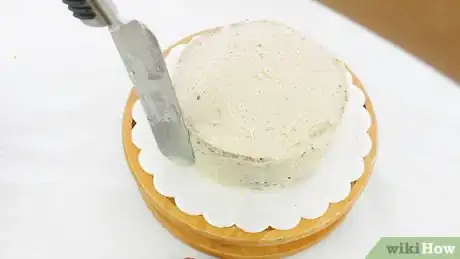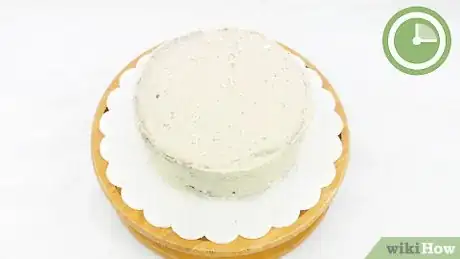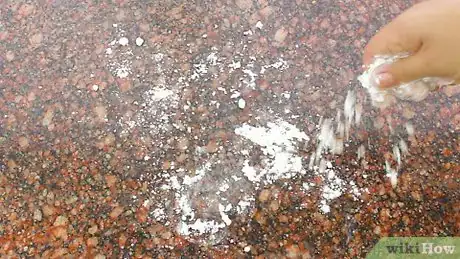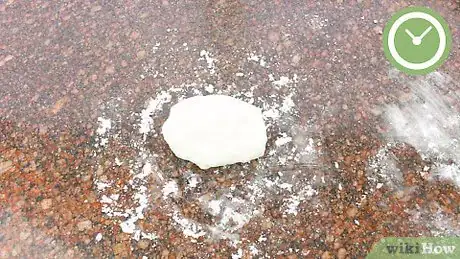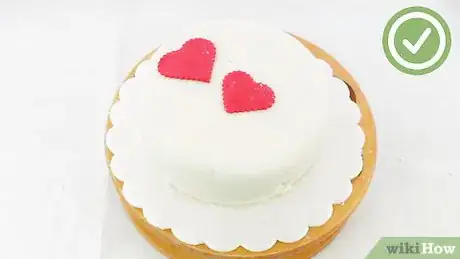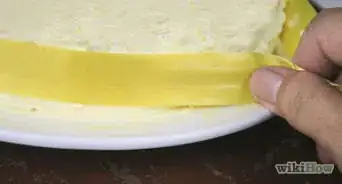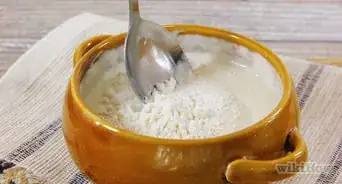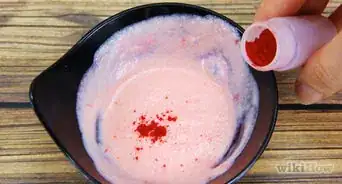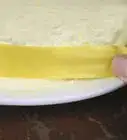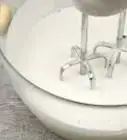This article was co-authored by Maha Mohamed. Maha Mohamed is a Custom Dessert Artist and the Owner of Sweet Treats SJ. Maha has over ten years of experience creating custom treats for special occasions. She specializes in custom cakes, cupcakes, cookies, and chocolate-covered treats.
wikiHow marks an article as reader-approved once it receives enough positive feedback. This article has 31 testimonials from our readers, earning it our reader-approved status.
This article has been viewed 980,362 times.
So you want to fondant a cake, but you've heard it's too difficult? It may seem challenging, but it's not as hard as you might think. With a little practice and know-how, you'll be able to easily fondant a cake and create a spectacular presentation.
Ingredients
- Buttercream
- Fondant
- Powdered sugar (or cornstarch)
- Cake
Steps
Getting Started
-
1Prepare your buttercream and set aside. Then measure the top and sides of your cake with a piece of string. Lay a long piece of string over the top of the cake and fold the ends down against the sides of the cake. Trim of any excess string that touches the plate. Take the string off and set it aside. You will be using it to measure the size of your fondant.[1]
- If you are doing a multi-tiered cake, measure one tier at a time.
- For any other cake, measure the greatest width across the top (this would be diagonal from corner to corner on a square or rectangle cake) and then add twice the height.
-
2Cover the cake with a thin layer of buttercream using a palette knife. The buttercream will help the fondant stick to the cake, so make sure to get the top and sides of the cake. Try to get the surface as smooth as possible, as any bumps will show. If there are any cracks or holes in the cake, be sure to fill them in using buttercream and then smoothing it down.[2]
- Consider using a cake decorating turntable to make this step easier and quicker.
- You can also use light or dark ganache or apricot jam instead of buttercream.[3]
Advertisement -
3Put the cake in the refrigerator for 30 minutes. This will give the buttercream enough time to harden. If the buttercream is too soft, the fondant will slide right off.
-
4Clear a large, smooth work surface and dust it with powdered sugar. The surface must be smooth, as any imperfections will get imprinted in the fondant. Lightly dusting the surface with powdered sugar will prevent the fondant from sticking to your work surface.
- If it is humid where you live, use a mixture of one part cornstarch and one part powdered sugar. If it is very dry, then consider using a thin layer of vegetable shortening.[4]
-
5Allow your fondant to reach room temperature. This will make it easier to work with. You can knead it for about five minutes to make it softer and easier to work with; do not let it get too soft and sticky, however.
- Knead some tylose powder into the fondant if you'd like it to dry and harden more quickly.
- Consider kneading in some gel or paste icing color. You can also add in some flavoring as well. Do not use a liquid food coloring.[5]
Rolling and Using the Fondant
-
1Use your hands to flatten the fondant into a rough pancake shape. Do not make it too thin yet. If you are covering a square or rectangular cake, then flatten the fondant into a square or rectangular shape.
-
2Roll out the fondant until it is about 1/4 to 3/8 inch (0.64 to 0.95 centimeters) thick. Make sure to turn the fondant 180° every so often while you are rolling it out. This will help keep it circular and even. Do not lift and flip the fondant over, as this may cause it to rip.
-
3Measure the fondant with the piece of string. Take the string you cut earlier and lay it across the fondant. The fondant should be the same size as the string or a little bit bigger; you can always trim any excess fondant off later.
-
4Loosely roll the fondant onto the rolling pin. Place the rolling pin at one end of the fondant, and roll it towards the opposite end, picking the fondant as you go. This will help you transfer the fondant to the cake and lessen the chances of it ripping.
- Lightly the rolling pin with powdered sugar before attempting this.
-
5Gently unroll the fondant over the cake. Place the rolling pin down on top of the cake, close to one of the edges, and roll it towards the other end, unwinding the fondant.
-
6Smooth the fondant over the cake. Start at the top first, then smooth down the sides, using your fingers. Make sure that there are no folds, wrinkles, or air bubbles.Trim off any excess fondant. You can use a knife or even a pizza cutter. Try to cut as close to the bottom of the cake as possible.
-
7Finish smoothing the fondant. You can give your cake a smooth, professional finish by "ironing" the surface of the fondant with a flat-sided glass or a fondant smoothing tool.
- Add shine by spraying it lightly with cooking oil mist and smoothing it over again.
-
8Finish decorating the cake. You can leave the cake as it is, or you can add decorations to it using buttercream frosting, such as lettering, swirls, or flowers. You can also use embossed silicon gel mats to give your fondant a pattern.
-
9Finished.
Expert Q&A
Did you know you can get premium answers for this article?
Unlock premium answers by supporting wikiHow
-
QuestionHow do I fix sticky fondant?
 Maha MohamedMaha Mohamed is a Custom Dessert Artist and the Owner of Sweet Treats SJ. Maha has over ten years of experience creating custom treats for special occasions. She specializes in custom cakes, cupcakes, cookies, and chocolate-covered treats.
Maha MohamedMaha Mohamed is a Custom Dessert Artist and the Owner of Sweet Treats SJ. Maha has over ten years of experience creating custom treats for special occasions. She specializes in custom cakes, cupcakes, cookies, and chocolate-covered treats.
Custom Dessert Artist
-
QuestionHow do you make fondant for a cake?
 wikiHow Staff EditorThis answer was written by one of our trained team of researchers who validated it for accuracy and comprehensiveness.
wikiHow Staff EditorThis answer was written by one of our trained team of researchers who validated it for accuracy and comprehensiveness.
Staff Answer wikiHow Staff EditorStaff AnswerTo make your own silky smooth fondant, check out our article: How to Make Fondant, where you'll find both ingredients and instructions for either classic fondant or marshmallow fondant.
wikiHow Staff EditorStaff AnswerTo make your own silky smooth fondant, check out our article: How to Make Fondant, where you'll find both ingredients and instructions for either classic fondant or marshmallow fondant. -
QuestionCan you put a cake with fondant in the refrigerator?
 wikiHow Staff EditorThis answer was written by one of our trained team of researchers who validated it for accuracy and comprehensiveness.
wikiHow Staff EditorThis answer was written by one of our trained team of researchers who validated it for accuracy and comprehensiveness.
Staff Answer wikiHow Staff EditorStaff AnswerUsually, it is best to to avoid storing a cake decorated with fondant into the refrigerator because the fondant goes soft from the moisture and the fondant colors can run as the cake "sweats." Try to keep the cake at room temperature on a bench or pantry shelf, since both the cake and fondant has a lot of sugar, this will help to help preserve the cake at room temperature. However, if it’s too warm and you really need to refrigerate the fondant-covered cake, first place the cake inside plastic wrap, then inside a corrugated cardboard box. Tape shut before placing it into the fridge, to keep out as much moisture as possible. For more help with storing a fondant cake, including freezing it, see How to Store a Fondant Cake.
wikiHow Staff EditorStaff AnswerUsually, it is best to to avoid storing a cake decorated with fondant into the refrigerator because the fondant goes soft from the moisture and the fondant colors can run as the cake "sweats." Try to keep the cake at room temperature on a bench or pantry shelf, since both the cake and fondant has a lot of sugar, this will help to help preserve the cake at room temperature. However, if it’s too warm and you really need to refrigerate the fondant-covered cake, first place the cake inside plastic wrap, then inside a corrugated cardboard box. Tape shut before placing it into the fridge, to keep out as much moisture as possible. For more help with storing a fondant cake, including freezing it, see How to Store a Fondant Cake.
Things You'll Need
- String
- Rolling pin
- Smooth, clean surface to work on
- Knife or pizza cutter
- Fondant smoothing tool (optional)
References
- ↑ BBC Good Food, How to Marzipan a Cake
- ↑ BBC Good Food, How to Cover a Cake with Fondant Icing
- ↑ Pastry Chef Central, Rolled Fondant Cake Covering Procedures
- ↑ Wilton, Fondant Tips & Tricks
- ↑ Pastry Chef Central, Rolled Fondant Cake Covering Procedures
- Videos provided by CupcakeJemma
About This Article
If you want to fondant a cake, cover the cake with a thin layer of buttercream to seal in any crumbs. Place the cake in the refrigerator for 30 minutes to allow the buttercream to harden, then roll out your fondant into a thin sheet on a flat surface dusted with powdered sugar. Loosely roll the fondant onto your rolling pin and drape it over the cake, smoothing it out from the top down. Trim the fondant to fit the cake, then finish decorating. Read on to learn how to measure your fondant!
